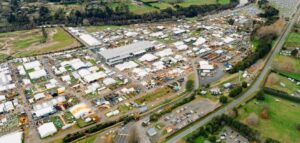A Helping Hand through Teaching
An event to handover sets of resources to support new speakers of English, was celebrated last week at Discovery Christian Centre in Hamilton.
The project was an initiative of Wintec academic Gail Pittaway, who is also the co-organiser of Hamilton Book Month. Pittaway partnered with the English Partners Waikato and two former teachers from the Wintec Centre for Languages Celia Hope and Jenny Field. The project was funded by grants to support literacy, secured by Hamilton Book Month from Trust Waikato and Wintec Research.
The resources were donated to English Language Partners (ELP) Waikato. This group helps former refugees, who are learning English through the English for Speakers of Other Languages (ESOL) Literacy programme, to have a new beginning here in Aotearoa, New Zealand.

Jenny Field, who worked at Wintec–Te Pūkenga and English Language Partners Waikato, taught the English language to adult migrants and former refugees, and developed a series of short stories.
Jenny started writing interesting, relevant stories of around 50 words for the learners in her class, so that the students could read easily. The stories were designed to encourage her students to read more, because learning a new language is difficult as an adult

Chatting and socialising with her students also helped the learning process to become a two-way interactive exchange.
Jenny was inspired to write short stories for people because she said, in the New Zealand environment, appropriate interesting reading beginner level language for adults can be difficult to find.
She started writing those short stories with her colleagues at Wintec and the students enjoyed them that is why she kept on writing.
Celia Hope is a trained Early Childhood Educator and adult ESOL teacher. As well as teaching in Aotearoa, New Zealand, she taught in Thailand and some part-time teaching while she was living in Canada.
When Celia returned to New Zealand, she started teaching ESOL literacy to women, mostly from refugee backgrounds. She also found her two years in Thailand gave her an appreciation of living in another culture and having to learn a new language as she never mastered reading and writing Thai.
She taught a class informally called ‘Migrant Mothers’ for fourteen years. This was a Wintec class, then it became an English Language Partners ESOL class and was held in a classroom at Hamilton East School.

Celia started writing stories with students using the Language Experience approach. She took photos of the activities she was doing with her students and developed a story about their experience. There she saw a potential for stories to be recorded so learners could see and hear the words. So, she developed PowerPoint read along stories.
She was inspired to write for former refugees because most of the women in her class had very little or no formal education and many had never learned to read or write in their first language, so it was even more difficult for learners to read and write in English.
She and her co-tutors felt that using the oral language would be helpful to bridge the language barrier. Also, Celia said that it was very difficult to find simple stories for adults which were relevant to the learner’s lives and of interest.

Celia’s time in Thailand also gave her an appreciation of how disempowering it could be to not to be able to discuss her health with the doctor she went to, and she needed to find a doctor who spoke her language. Former refugees usually don’t have that choice.
At the resource handover celebration, many of the ESOL class in attendance were former refugees from Afghanistan and a translator was present to help with understanding the introductions and and while handing out the resources to the students.
One of the tutors present was Kit Ong. Kit is from the Philippines and has been in New Zealand for almost twenty five years. She has been teaching Literacy class since 2020. Before that, she handled an English Language Group (ELG) class for almost ten years. She started with a Chinese group then eventually with students with different cultural backgrounds, mostly Asians and Eastern Europeans. She started as a volunteer at an ELG class and has written short simple passages related to the topic.
The ELP Waikato management and Celia Hope have been very supportive and generous giving Kit the orientation about the background and profile of the learners. Her teaching experience in the ELG class has also been a great help in her transition to Literacy teaching. Kit has also read articles about the former refugees in New Zealand. which helped her understand their situation and made her want to help them in any way that she can.

Photo: Ronella Felizardo
Kit, along with her dynamic team of Cultural Language Assistant (CLA) and volunteers, teach the learners basic literacy skills in writing, reading, numbers and speaking. As the learners progress, the learning space becomes more relaxed and interactive. Along the way, they start to build and nurture relationship and develop trust with the learners. She and her students exchange knowledge about each other’s culture, beliefs, their families, their life in New Zealand and sharing of anecdotes. It also helps that there is a cultural assistant who knows how to speak the learner’s first language.
Kit was inspired by the fact that by teaching former refugees the English language is also helping them cope with the challenges in life in Aotearoa. She is also inspired by her former students’ success stories because some of her students have opened small businesses and some have moved to higher level English classes.
This event is a helping hand to learners who are studying the English language and give the former refugees confidence to socialise with others and have new opportunities in life.




